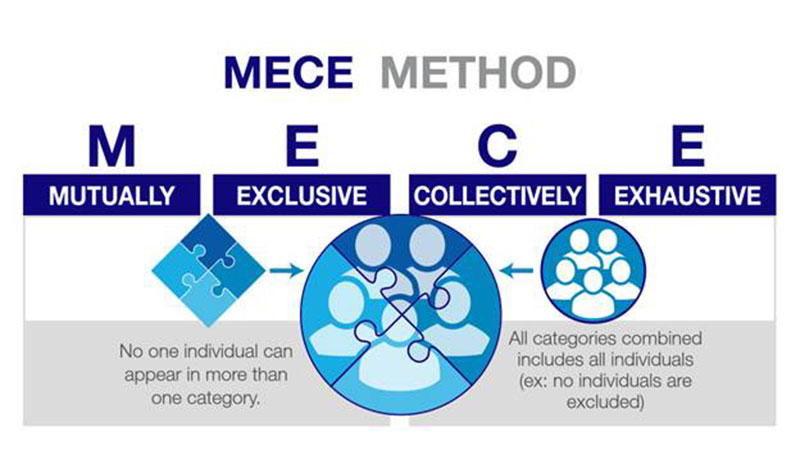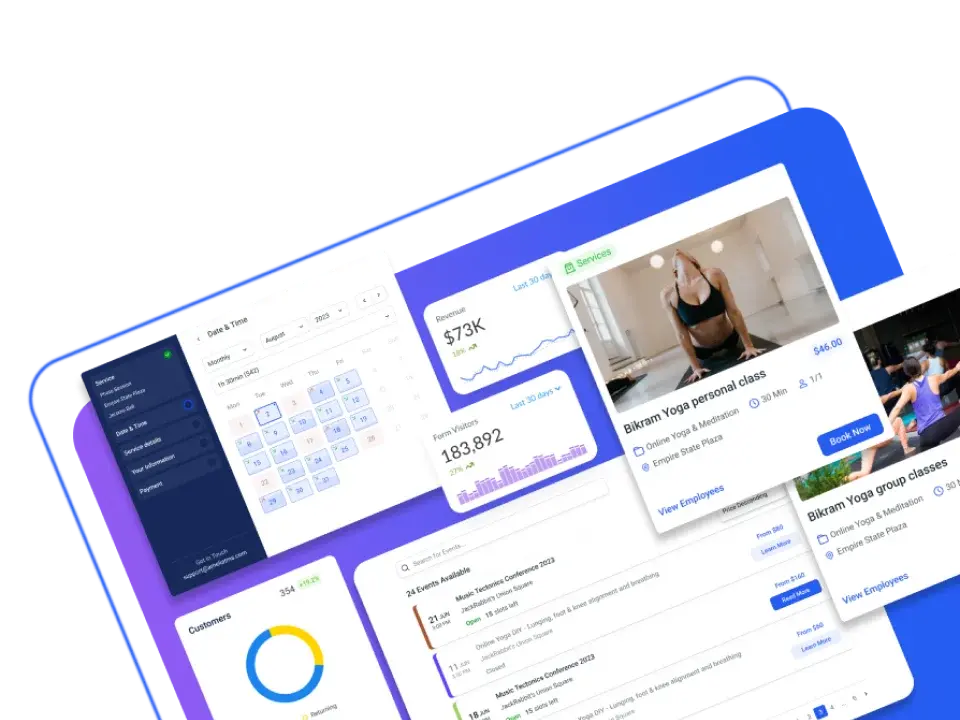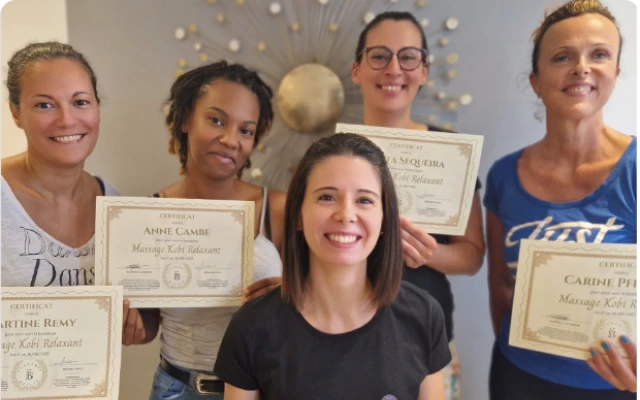Have you ever wanted to start your own business? If you have, but can’t seem to find your niche, then being a consultant may be one of the easiest ways to test the waters, since you are in control of the services you offer, and can pick what you are most passionate and knowledgeable about.
In the ever-evolving online world, there will always be buzzwords that exist, and knowing how to define these words will better allow you to participate in the conversation and stay involved. Buzzwords are very important for consultants because they can be a position statement in terms of what you know and what you need to do.
In this article created by our team at Amelia (the best WordPress events plugin), we have decided to provide a list with some consulting buzzwords that are often seen and for sure they can be helpful if you deal with consultants or you are one yourself.
The List of Consulting Buzzwords You Should Know
20,000-Foot View
The first on our list of buzzwords is “20,000-foot view”. It is defined as a summary of a certain situation where many details are omitted and only the key points are being discussed. In other words, think about it as seeing things in perspective. Sometimes, you may also hear “bird’s eye view” or “the 1,000-mile view”.
80/20 Rule
Popular in the business world, this rule states that 80% of a business problem can be solved by focusing on 20% of the causal factors. So, any consultant is going to say that 80% of an assignment can be done in 20% of the time by adding value.
As-is and to-be
Two other consulting terms that you may encounter are “as-is” and “to-be”, which are both basically a consultant’s way of describing what is being done now and how it is going to look after the job is completed.
At The End of the Day
Another popular term used by consultants is “at the end of the day”. Consultants can use this term when they are about to summarize the main thrust of a point or argument. This phrase is used in order to attempt summarization or to even close a discussion. Most consultants know it, and you should too.
Bandwidth
This buzzword is generally used in the capacity of taking on other work commitments. If you have a certain amount of energy that you can bring to a project, this is usually called bandwidth by consultants. It is a simple term takes the pressure off of other lines, such as “I do not know how to do this”, and is quite useful.
Boil the Ocean
It can be fun to understand these types of consulting buzzwords because they can sometimes be used in the context of tough tasks that have almost no value. It shows what can happen if a consultant is not focused and can be used in many different topics, depending on when and how the consultant thinks it is appropriate.
Bottoms-Up
These consulting buzzwords are great to use when you want to look at the smallest units possible in order to initiate the analysis. An example might be to start with the lowest-level employee in order to make the analysis of a company.
CAGR
This acronym buzzword stands for Compound Annual Growth Rate. If a market starts from $100 million to $150 million, in 5 years you can make a percentage of the CAGR and use it in different presentations.
C-Suite
A cool consulting jargon, the C-Suite refers to any executive with a capital C at the beginning of their title. The C stands for “Chief”: COO, CFO and so on.
Deck
 Image source: Erick Chévez / VÚO
Image source: Erick Chévez / VÚO
Simple consulting buzzwords like this one are commonly used and are generally used to refer to presentations that are done in different programs.
Deliverable
What you are going to send to your clients, whether it is a presentation, a sheet or report, or anything else will be known as deliverables. Consultants use this buzzword when the task is completed and everything that should reach the client is ready to send.
Hard Stop
You can use this buzzword in order to indicate that after a certain time the person that is helping a team, for example, is not going to be around anymore to help them. It is a polite saying used when people might have other obligations to do and need to leave sooner than anticipated.
Leverage
You will find consulting buzzwords like Leverage in reports most often because they give a sense of strength or careful thinking that can help you with the resources. It can be added to documents especially when a consultant can be done using the proposed method.
Let Me Play This Back
These buzzwords are used when listeners want to give to the discussion their own perspective after reviewing the transcript of what was said. It is a helpful method that can allow consultants to check if they understood the key issues and sound more eloquent,even if the summary did not add any additional insights.
Low-Hanging Fruit
This term is mostly used in sales when describing certain deals that may be easier to close than others.
MECE

Another acronym set of buzzwords that stands for Mutually Exclusive and Collectively Exhaustive. You will see it a lot in management consulting firms and it can be considered a grouping principle. It can be expressed to show concern towards an analysis where some data might be missed.
Offline
We all know this one as people connected it with not being available and can be used to table a conversation until after the format meetings. It is also good to balance meetings and now allow just two persons to monopolize the meeting time that they have.
Push Back
Usually, certain consulting buzzwords are a great way to take some of the pressure off in a situation. For example, this one is good to show a consultant that something is difficult and cannot be realistic. When a teammate can over-promise or is unrealistic pushing back is very important. So, for sure many of us have felt this before and we can really understand the idea of pushing back.
Rock Star
An individual that has high results in a certain area and is impressive, this buzzword is usually used to express this admiration towards somebody. It is a way of putting the spotlight on them by expressing gratitude. Maybe your team member helped you in an unexpected way when nobody was around, resulting in you thinking of him as a rock star.
Scope Creep
A management consultant can be brought in to find out why a company’s new marketing strategy is affecting workplace productivity. Scope creep appears when they find that they also need to do other tasks not initially mentioned at the beginning of the project.
Smell Test (Sniff Test)
These consulting buzzwords are used when a certain analysis is being challenged. It goes from the simple idea of checking your food or drink by smelling it until you consume it in order to be sure that it is not already rotten.
Takeaway
This term is a more English term and while it originally related more to carry-out food,in the consultancy domain, it stands for the main points that the audience needs to understand at the end of a presentation. The takeaway is the goal that the presentation has in terms of learning or adapting certain things.
Take The Lead On
We really liked these consulting buzzwords, as they are strongly worded and express a leading principle. They are mainly used in situations where somebody asks a person to continue the topic or presentations from that moment. So, if somebody is telling you to take the lead on something, then you should know that somebody has delegated you to be in charge of going forward.
FAQs about consulting buzzwords
1. What are some of the most commonly used consulting buzzwords and phrases?
Among the terms and buzzwords most frequently used in consulting are “synergy,” “disruptive innovation,” “best practices,” “paradigm shift,” “scalability,” “agile,” “deep dive,” “thought leadership,” “value proposition,” and “ROI.” These buzzwords are frequently used to impress clients, showcase competence, and show an understanding of market trends.
2. How can I learn to use consulting buzzwords effectively in my communication with clients?
Understanding the meaning and context of consulting jargon is crucial to use it correctly. Take the effort to comprehend the concepts behind buzzwords and utilize them in a way that adds value to the conversation rather than utilizing them as a crutch.
Overusing buzzwords should also be avoided because it may come across as annoying or insincere.
3. What are some examples of consulting buzzwords that are overused and should be avoided?
Overused buzzwords in consulting, such as “disruptive,” “innovative,” “synergy,” and “transformation,” should be avoided. Although these phrases may have had some force in the past, overuse has rendered them cliched and even useless.
4. How can I integrate consulting buzzwords into my business strategy and planning?
Using buzzwords can help you explain difficult ideas and concepts to others in a clear and memorable manner.
It’s crucial to utilize buzzwords carefully and in a way that supports your overall message when incorporating them into your business strategy and planning. Be careful not to overuse buzzwords and make sure they are meaningful additions to the discussion.
5. What is the purpose of using consulting buzzwords in business communication?
The goal of employing consulting buzzwords in business communication is to appear impressive to clients, express competence, and show an understanding of industry trends. Buzzwords can aid in conveying complicated ideas succinctly and vividly, and they can be helpful in establishing credibility with stakeholders and clients.
6. What are some tips for using consulting buzzwords without sounding like a “buzzword bingo” player?
Understanding the meaning and context of consulting buzzwords is crucial for using them in a way that adds value to the dialogue. Instead of overusing buzzwords, concentrate on expressing your ideas in a clear and succinct manner.
Adapt your communication style to your audience as well, and refrain from employing trendy terms that your audience might not be familiar with.
7. How can I identify if someone is using consulting buzzwords to sound knowledgeable or impressive without actually providing substance?
Asking someone to elaborate on the buzzword’s underlying idea can help you determine whether they are using them carelessly.
If they are unable to do so or if their response is ambiguous or unpersuasive, it may be an indication that they are using buzzwords to appear informed without actually offering anything of substance.
8. Are there any negative consequences to overusing consulting buzzwords in business communication?
Overusing consulting buzzwords can be detrimental, making the speaker come off as obnoxious, disingenuous, or even dishonest. Furthermore, using buzzwords without comprehending their significance or context can erode credibility and harm business partnerships.
9. Can using consulting buzzwords be detrimental to effective communication in business?
If they are overused or applied incorrectly, consulting buzzwords can be harmful to company communication. Buzzwords can be a helpful tool for expressing complex thoughts and concepts when utilized carefully and in a way that adds value to the discourse. However, they might obstruct efficient communication if employed excessively or without sufficient comprehension.
10. How can I stay up-to-date on the latest consulting buzzwords and trends in the industry?
Reading trade journals, going to conferences, and networking with other industry experts are some ways to remain current on the newest consulting buzzwords and trends. You may also stay up-to-date on the latest buzzwords and trends by following key thought leaders on social media or subscribing to industry newsletters and blogs.
However, it’s crucial to avoid mindlessly embracing jargon and instead concentrate on comprehending its meaning and context before incorporating it into your writing.
Ending thoughts
Lastly, on our consulting buzzwords list, we get this phrase that is mostly used when somebody on the team challenges you to explain the goal of a certain task or presentation, comparing it with their own reality.
If you enjoyed reading this article with consulting buzzwords, you should also check out this article on consulting business ideas.
We also wrote about a few related subjects like how to get consulting clients fast, technology consulting, consulting proposal template examples, how much to charge for consulting, tips for becoming a self-employed business consultant. Maybe you need a consulting contract or tips to overcome the business challenges that a consultant like you is facing.
And if these are something you enjoyed reading, check out our WordPress booking plugin that your clients can use to schedule meetings with you.


